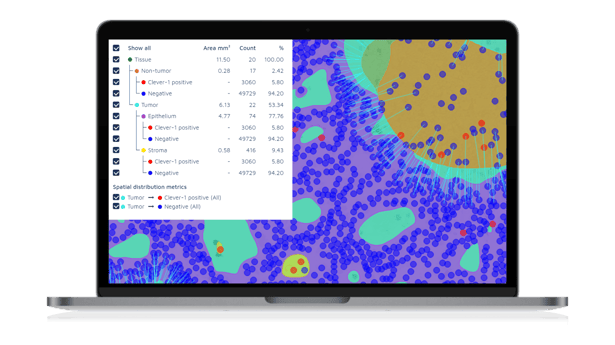In cancer patients, the immune system's ability to recognize and destroy cancer cells is often suppressed due to several factors. Cancer cells can evade detection by the immune system by expressing unique or altered proteins on their surface, making it difficult for the body to identify them as foreign. Some cancer cells can produce substances that inhibit the activity of immune cells or activate regulatory T-cells, which suppress other immune cells. Chemotherapy and radiation therapy can also inhibit the immune system by killing cancer cells as well as healthy immune cells.
Faron Pharmaceuticals is developing Bexmarilimab, a monoclonal antibody that targets Clever-1, a protein found on the surface of immune cells. The company is testing Bexmarilimab's ability to activate the immune system against cancer cells by blocking Clever-1's inhibitory effects.
Elisa Vuorinen, a Research Project Manager at Faron, discusses building an AI model to quantify and localize Clever-1 in the tumor microenvironment using Aiforia® Create in this research project.
Describe the research project you used Aiforia for
"We utilized Aiforia Create to generate an algorithm that could automatically score our immuno-oncological monoclonal antibody drug’s target molecule, Clever-1, in IHC-stained cancer tissues. We focused on the viable cells stained positive and the localization of the positive cells in the tumor epithelium versus stroma."
What is unique about the project?
"We performed spatial analyses on our sample images by measuring the distances from Clever-1 positive macrophages to tumor borders. Spatial analysis is not simple to complete systematically with a human reader.
Aiforia’s AI solution assisted us in accurately extracting these measurements from our images with a relatively short turnaround time. Due to this, our team did not need to perform this repetitive and cumbersome task manually. We saved time and effort and were able to focus on other parts of our project."

Why did you decide to use Aiforia?
"Aiforia is a leader in the AI-assisted pathology field. As a Finnish company, we also wanted to utilize Finnish cutting-edge expertise.
Additionally, Aiforia was able to develop a custom AI model for us. Our team evaluated the algorithm's performance after Aiforia's pathologist completed the initial training. We then provided feedback on elements we considered wrongly classified to improve the model’s performance. The final result was the product of a collaboration between our team and Aiforia’s scientists."
How did you find getting started with Aiforia?
"Getting started was easy, and the user interface of Aiforia’s software was quite intuitive."
What is the biggest benefit of Aiforia to your project?
"The automated scoring of Clever-1 positive cells sped up the pathological scoring of our tissue samples, which we are routinely staining as part of our ongoing clinical trials. Pathologists at a contract research organization currently do this work, and the availability of pathologists is often a limiting factor in obtaining timely results. This research project will help us identify patients who can benefit from our experimental cancer treatment, so we foresee promise in Aiforia as our companion in diagnostic development."
Read more cancer case studies: